[Issue Briefing] South Korean Perception of Foreign Affairs: Rising Hostility, Narrowing Identity and Supporting the U.S. Role
Commentary·Issue Briefing | 2020-07-21
Sook Jong Lee, Sea Young Kim
Editor's Note
In 2005, the East Asia Institute (EAI) initiated the Korean Identity public opinion survey aimed at identifying the shifting values and identity of South Koreans. Since then, the survey has been conducted once every five years to analyze long-term trends of how South Korean people perceive themselves and others. The fourth Korean Identity survey, which was conducted from May 6 to 27, 2020, covers South Korean views of history, social participation, social conflicts and foreign affairs. This issue briefing series provides a first-hand analysis of the results on the South Korean perception of foreign affairs, which display rising South Korean hostility toward surrounding nations, narrowing sense of national identity, and continued support for the U.S. role on the Korean Peninsula and the wider region. The first issue briefing of four deals with South Korean views on outbound and inbound globalization and threats to national interest.
[Issue Briefing Series] "Rising Hostility, Narrowing Identity and Supporting the U.S. Role"
Robust Support for Economic Globalization but Dampened Support for Aid and Migration
South Koreans continue to express wide support for and embrace the adoption of free trade agreements with other nations (80.7% in 2020 and 82.6% in 2015). This provides a glimpse into how South Koreans view globalization as a tool for securing export markets. At the same time, however, their support for the usage of domestic products has also grown over the past five years. In 2015, 53.1% of the respondents had agreed that the use of domestic products is anachronistic in the era of globalization. In 2020, more respondents (54.6%) disagreed with the statement than those in support (46.5%). In 2020, a similar reversal has occurred in which more respondents (54.2%) stood against the idea of providing further aid to developing nations than those in support (45.9%). Five years ago, more respondents (50.9%) had supported increased aid towards developing nations than those who had disagreed (49.1%). These trends reflect the current difficulties faced by the domestic economy.
Figure 2: South Korea Should Adopt More Free Trade Agreements (FTA) in the Era of Globalization
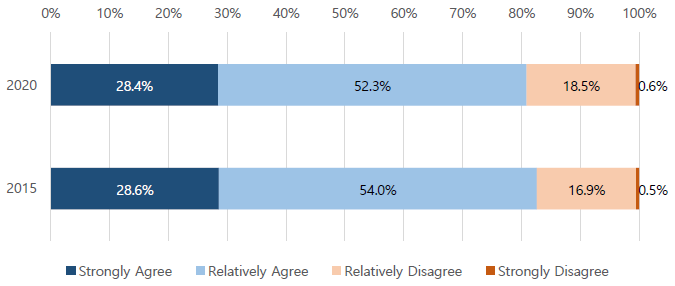
In both the 2015 and 2020 surveys, the percentage of respondents against the easing of foreigners’ acquisition of Korean nationality (65.8% in 2015 and 66.4% in 2020) nearly doubled that of those in support (34.2% in 2015 and 33.6% in 2020). This reflects a strong sense of national identity perceived by South Koreans when defining the necessary citizenship qualifications. Although South Koreans support globalization as a tool for expanding trade and exports, they remain hesitant to accept foreigners as South Korean citizens.
Figure 3: Foreigners should be able to Acquire South Korean Nationality More Easily
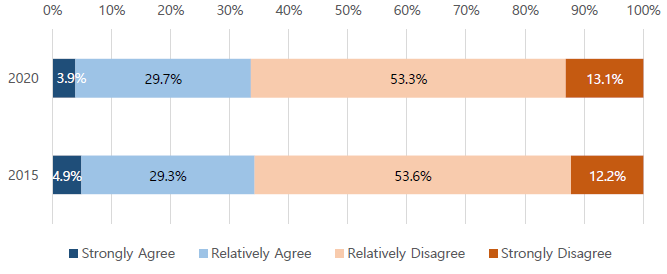
Rising Awareness of Pandemic and Environment Risks amid Globalization
The drawbacks of globalization have hit South Korea hard especially in times of COVID-19. For instance, 84.5% of the respondents agreed that it is difficult to prevent the spread of harmful diseases. 74.5% of the respondents also argued that globalization has incurred domestic socio-economic inequalities. Furthermore, 69.5% of the respondents stated that large foreign corporations are damaging to the domestic economy, demonstrating a 5.7% increase since 2015 (63.8%).
Figure 4: Due to Globalization, It Has Become More Difficult to Prevent the Spread of Harmful Diseases

Figure 5: Due to Globalization, Domestic Socio-Economic Inequalities Have Increased in South Korea

Figure 6: Large Foreign Corporations Are Increasingly Damaging the South Korean Domestic Economy
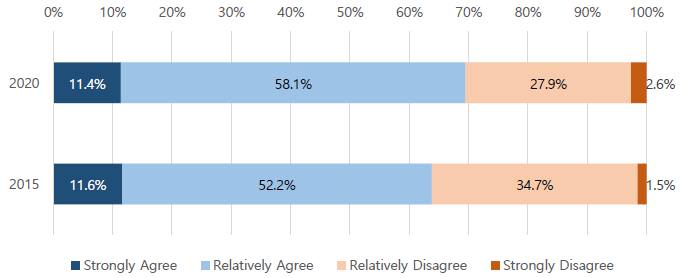
Strong Trust in International Organizations and Rules
South Koreans also show continued support for international organizations. For example, in both the 2015 and 2020 surveys, nearly 60% of the respondents (59.1% in 2015 and 58.5% in 2020) stated that the South Korean government should heed to the decisions made by international organizations even if the South Korean government may hold different views on shared issues. Considering how many South Koreans still perceive that the nation is not being adequately treated on the international stage (65.1% in 2015 and 57.9% in 2020), such results infer that South Koreans maintain a position of acceptance when it comes to decisions made by international organizations.
Figure 7: South Korea Should Heed to Decisions Made by Intl Organizations despite Differences in Opinion
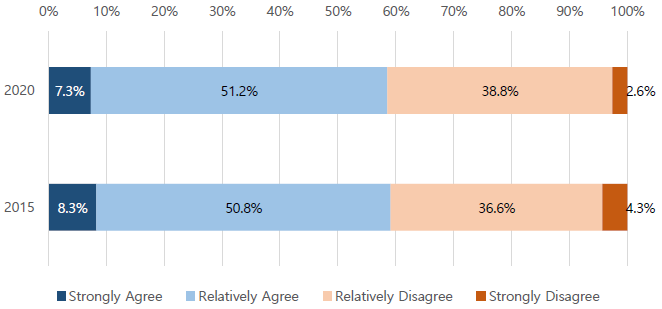
Strengthened Nationalism: Dokdo, Strong Military and Nuclear Armament
The survey also sheds light onto the competitive dynamics between globalization and South Korean nationalism. For instance, there is an overwhelming and continued support for the statement that South Korea should protect its territory of Dokdo no matter the cost (87% in 2010, 93.9% in 2015, and 90% in 2020). In addition, more South Koreans believe that the nation needs a stronger military to survive in the international society (70.7% in 2010, 85.2% in 2015, and 82.2% in 2020). A generally positive trend can also be seen for the question asking whether South Korea should possess its own nuclear weapons (66.5% in 2005, 68% in 2010, 71% in 2015, and 61.8% in 2020).
However, as discussed in the previous section, South Koreans’ strong sense of nationalism does not necessarily lead to distrust in international organizations. In addition, diverging South Korean attitudes and perceptions towards globalization cannot be explained solely by differentiating pro-nationalistic and pro-globalization sentiments. Rather, nationalism and globalization are interlinked as nationalistic sentiments help to heighten South Korea’s national prestige and international standing.
Figure 8: South Korea Should Protect the Dokdo Territory No Matter the Cost
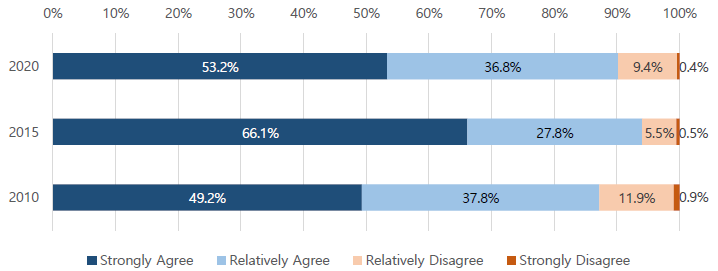
Figure 9: South Korea Needs a Stronger Military to Survive in the International Society
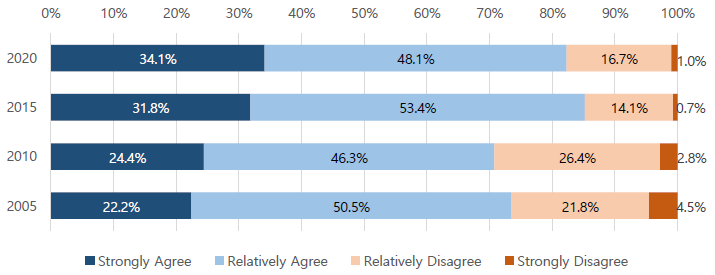
Figure 10: South Korea Needs Its Own Nuclear Weapons
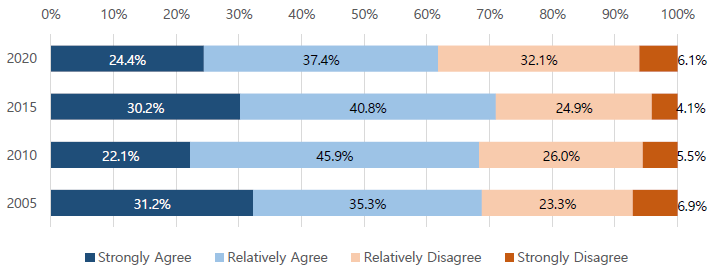
Threats to National Interest for the Next 10 Years
Pandemic as the Number One Threat
For the questions addressing the risk factors for South Korea’s national interests in the next decade, respondents had the options of labelling them as either “very threatening,” “somewhat threatening,” and “not a threat at all.” The top three national threats according to the 2020 survey’s “very threatening” responses were the following: 1) infectious diseases (66.2%), 2) North Korea’s nuclear weapons (55.5%), and 3) environmental crises such as global warming (55.2%). These were then followed by international terrorism (46.4%), China’s rise as a great power (41.7%), energy supply and distribution (41.6%), disasters including nuclear disasters (41.6%), unemployment crisis due to the use of artificial intelligence (AI) (40.1%). With the COVID-19 pandemic, infectious diseases surpassed North Korea’s nuclear weapons as the first-rated threat for the first time in 2020. Specific survey findings are addressed categorically below.
Continuous Perceptions of Threats from North Korea
South Koreans continue to identify North Korea’s nuclear arsenal as the top-rated threat, as with instabilities and tensions on the Korean Peninsula. Those who saw North Korea’s nuclear weapons as a threat increased by 0.8 percentage points overall, from 94.5% in 2015 to 95.3% in 2020. What is noteworthy is the 14.3 percentage point upsurge in the number of respondents who saw it as “very threatening” from 2010 to 2015 (46.3% in 2010 and 60.6% in 2015). Likewise, more respondents identified tensions and instabilities on the Korean Peninsula as a threat compared to 2015 (93.3% in 2015 and 94.9% in 2020). [For more information, see the second issue briefing of the series: “South Korean Perception of North Korea and Unification: The Future of the Korean Peninsula, Neighbor rather than Brother”]
China’s Rise and Intensifying U.S.-China Hegemonic Competition:
According to the three surveys conducted in 2010, 2015 and 2020, more than 90% of South Koreans believe that China's rise is a national threat (92.6% in 2010, 95.1% in 2015, and 94.7% in 2020). The percentage of respondents who defined it as “very threatening” also further increased by 2.7 percentage points since 2015 (from 39% in 2015 to 41.7% in 2020). With regards to U.S.-China hegemonic competition, threat perception increased by 5.3 percentage points (89.4% in 2015 and 94.7% in 2020). Those who defined it as “very threatening” rose by 10.5 percentage points since 2015 (24.4% in 2015 and 34.9% in 2020). 95.3% of the respondents also identified the U.S. “America First” policy as a threat with 31.4% seeing it as “very threatening.” Despite these developments, however, support for the ROK-U.S. alliance remains strong. [For more information, see the third issue briefing of the series: “South Korean Perception of the United States and China: United States, a More Favorable Partner than China”]
Further Parting Away from Japan
South Koreans continue to identify Japan’s militarization and bilateral conflicts with Japan as threats to national interests. However, such threats rank below China’s rise as a great power and the U.S.-China rivalry. While bilateral tensions have risen with Japan, little change has been made in the responses from the 2015 and 2020 surveys. For instance, from 2010 to 2015, there was an overall 15.9 percentage point increase in the number of respondents who saw Japan’s militarization as a threat (74.6% in 2010 and 90.5% in 2015), with a 12.6% increase in those who defined it as “very threatening” (19.0% in 2010 and 31.6% in 2015). However, the figures in 2015 have been overall maintained as 89.7% saw it as a threat in 2020, with 31% opting for the “very threatening” option. Furthermore, while 89.5% of the respondents answered that South Korea-Japan tension is a threat, only 25% of the same respondents see it as “very threatening.” This is also not a significant development from the past as 90% of the respondents saw bilateral conflicts as a threat in 2015, with 25.4% selecting the “very threatening” option. [For more information, see the fourth issue briefing of the series: "South Korea’s Hostile Views toward Japan amid Aggravating Bilateral Relations"] ■
■ Sook Jong Lee is a Senior Fellow and Trustee at the East Asia Institute and served the Institute as President from 2008 to 2018. She is also a professor of public administration at Sungkyunkwan University. Her recent publications include Transforming Global Governance with Middle Power Diplomacy: South Korea’s Role in the 21st Century (ed. 2016), Keys to Successful Presidency in South Korea (ed. 2013 and 2016), Public Diplomacy and Soft Power in East Asia (eds. 2011).
■ Sea Young Kim is a research associate and project manager at the East Asia Institute. Her recent publication includes "New North-Southeast Asia Security Links: Defending, Recentring, and Extending Regional Order” (Australian Journal of Politics and History, 2019).
■ Typeset by Sea Young Kim, Research Associate/Project Manager
For inquiries: 02 2277 1683 (ext. 208) | sykim@eai.or.kr
The East Asia Institute takes no institutional position on policy issues and has no affiliation with the Korean government. All statements of fact and expressions of opinion contained in its publications are the sole responsibility of the author or authors.
![[ADRN Issue Briefing] Decoding India’s 2024 National Elections](/data/bbs/eng_issuebriefing/20240419123938102197065(1).jpg)
Commentary·Issue Briefing
[ADRN Issue Briefing] Decoding India’s 2024 National Elections
Niranjan Sahoo | 2020-07-21
![[ADRN Issue Briefing] Inside the Summit for Democracy: What’s Next?](/data/bbs/eng_issuebriefing/2024032815145548472837(1).jpg)
Commentary·Issue Briefing
[ADRN Issue Briefing] Inside the Summit for Democracy: What’s Next?
Ken Godfrey | 2020-07-21